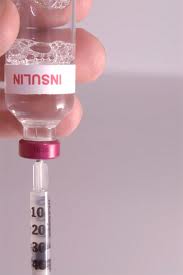Different Types of Diabetes
The three main types of diabetes that I'm going to discuss are:
Type 1 Diabetes
Type 1 diabetes, also called insulin-dependent diabetes, usually manifests in childhood or young adulthood. Type 1 diabetes affects 5 to 10% of people with diabetes and it's associated with complete destruction of the beta cells of the pancreas, which are the ones responsible for manufacturing insulin.
The type 1 diabetic requires lifelong insulin injections for the control of blood sugar levels.
Possible Causes of Type 1 Diabetes
The damage to the insulin-producing cells is caused by the body's immune system turning against its own
cells. There are various theories regarding the causes of type 1 diabetes. Some experts believe this may
result from an autoimmune response after a viral infection.

Another
interesting theory, although growing evidence seems to support it, is
that some susceptible babies who are given cow's milk too early in life,
i.e. earlier than 4 months, are more likely to develop diabetes later
on in life.
A protein present in dairy products, bovine serum albumin (BSA),
has molecules very similar to the insulin-producing cells in the
pancreas. The immune system of these genetically susceptible babies
mounts a response against these bovine proteins recognizing them as
foreign and forms antibodies to attack them.
Unfortunately these
antibodies attack not only the cow proteins but also the
insulin-producing cells of the pancreas. These pancreatic cells are
destroyed by so called "friendly fire". The destructive process is
gradual - when nearly all the insulin-producing cells are gone, type 1
diabetes results.
Researchers believe that the mature digestive
tracts of adults would not allow these dairy proteins to pass through
the intestinal wall and into the bloodstream, but in infants, the
molecules pass through more easily.
So one way to prevent type 1
diabetes, at least for many children, might be to avoid exposure to
cow's milk early in life. BSA can, however pass from the mother's diet
into her milk. So if breastfeeding mothers avoid beef and dairy products
the risk can be completely removed in genetically susceptible children.
Is there anything you can do about Type 1 Diabetes?

If you have been diagnosed with type 1 diabetes, no doubt you have heard that this condition, more than other types of diabetes, increases the risk of developing problems with your heart, kidneys, eyes or extremities.
But other factors contribute to the development of these problems, including high blood pressure,
cholesterol levels and so on. With the right diet you can avoid the complications of the various types of
diabetes.
With type 1 diabetes people tend to rely mainly on insulin injections, but there is
much more you can do to protect yourself.
Following the advice outlined in this series of
articles can help you achieve several things:
- Keep blood glucose under control
- Stabilize your cholesterol levels
- Keep blood pressure within a healthy range
- Protect your heart and your blood vessels from damage
Type 2 Diabetes
Type 2 diabetes (also called Non-Insulin Dependent Diabetes) is the most common of the different types of
diabetes.
Nine out of ten people with this condition have type 2. It used to be mainly
associated with older people but more and more children are being diagnosed with type 2
diabetes.
In type 2 diabetes, insulin levels are typically elevated, indicating a loss of
sensitivity to insulin by the body's cells. So the pancreas increases production of insulin to the point
that the beta-cells become exhausted or burnt out and eventually stop producing insulin.
This is
when a type 2 diabetic has to go on insulin injections.
But before anyone gets to that stage,
there's a lot that can be done to reverse this condition. Please read more about the Causes of Diabetes as well as:
Reverse Diabetes with Healing Foods
Gestational Diabetes
Gestational diabetes is similar to type 2 diabetes except that it occurs during the second half of pregnancy and it affects about 4% of pregnant women.
Hormonal changes during pregnancy can affect the body's resistance to insulin and the woman's ability to
process glucose is impaired.
It typically disappears after delivery, but it seems to be a
sign that the woman is more likely to develop type 2 diabetes in later life. Your baby may also be
bigger, increasing the chances of Cesarean delivery and the baby also has a greater risk of developing
diabetes.
With the same sorts of steps that tackle type 2 diabetes, you can often stop
gestational diabetes from ever turning into type 2.
To select you next article click on NEXT to read about the Symptoms of Type 2 Diabetes or go back to the Treatment of Diabetes main page.
|
Watch this video to learn about a Simple 3-Step Approach To Totally
Reverse Type 2 Diabetics |
Return to the Treatment of Diabetes main
page
Go to Foods' Healing Power Homepage from Different Types of
Diabetes
New! Comments
Have your say about what you just read! Leave me a comment in the box below.